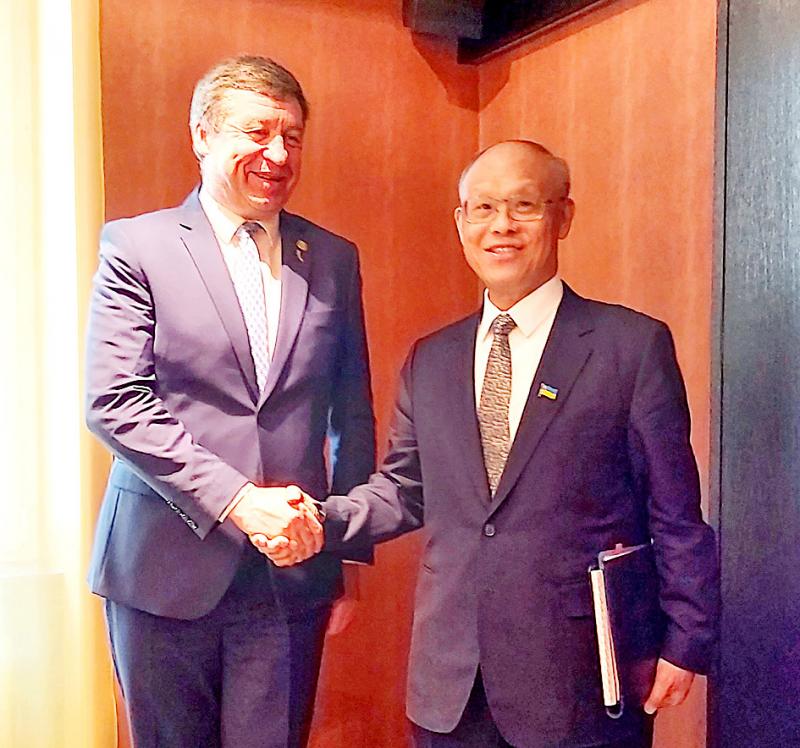Taiwan and Lithuania need to work together to resist Chinese economic coercion, officials said on the sidelines of a WTO meeting in Geneva, Switzerland, on Monday.
Minister Without Portfolio John Deng (鄧振中), Taiwan’s top trade negotiator, and Lithuanian Vice Minister of Foreign Affairs Raimundas Karoblis said that the two nations have faced retaliatory trade moves by China, while expressing confidence that bilateral trade would continue to grow.
Karoblis thanked Taiwan’s government and people for their support of Lithuania, and said he was certain that trade ties would remain strong.

Photo courtesy of the Permanent Mission of the Separate Customs Territory of Taiwan, Penghu, Kinmen and Matsu via CNA
Lithuania has a lot that it can learn from Taiwan’s semiconductor industry, which is part of the reason Lithuanian Vice Minister of the Economy and Innovation Jovita Neliupsiene is leading a delegation there, he said.
Neliupsiene arrived in Taiwan on Sunday with a group of representatives from the Baltic state’s high-tech sector.
The delegation visited the Taiwan Semiconductor Research Institute (台灣半導體研究中心) and the Industrial Technology Research Institute (工業技術研究院) yesterday and is to depart today.
Taiwan, for its part, could benefit from greater investment in Lithuania’s advanced laser and energy industries, said Karoblis, who served as Lithuania’s defense minister from 2016 to 2020.
Deng said that Taiwan and Lithuania have faced retaliatory trade moves by China in contravention of WTO regulations.
Lithuania had its exports illegally blocked by Chinese customs after Vilnius allowed Taiwan to set up a representative office there, while Taiwan has been hit by Chinese import bans on several types of fruit and grouper due to political factors, Deng said.
In response to these tactics, it is important that the two democratic countries stand together to demand that China meets its commitments under WTO trade agreements, he said.
Representative to the WTO Lo Chang-fa (羅昌發) said that the global trade groups’ guidelines make such “under the table” trade barriers difficult to regulate.
Karoblis said that the WTO should enact new rules against economic coercion to protect against unilateral moves by authoritarian countries and to safeguard the integrity of the multilateral trading system.
Ties between Taiwan and Lithuania have warmed in the past few years, with Taiwan opening the office in the Baltic state in November last year and establishing a US$100 million Central and Eastern Europe Investment Fund in January to promote business ties between the two nations.
In addition, Taiwan’s Export-Import Bank is to sign a memorandum on cooperation with Invega, a state-backed institution that offers financial services to small and medium-sized enterprises in Lithuania, which would help companies in the Baltic state import goods from Taiwan, the Ministry of Finance said in a statement on Monday.
Meanwhile, Lithuania is to open a trade representative office in Taiwan this year, the Lithuanian Ministry of Economy and Innovation said.
Bilateral trade increased by 30 percent in the first quarter this year to NT$44.87 million (US$1.51 million), data from Taiwanese customs agencies showed.

Taiwan would remain in the same international network for carrying out cross-border payments and would not be marginalized on the world stage, despite jostling among international powers, central bank Governor Yang Chin-long (楊金龍) said yesterday. Yang made the remarks during a speech at an annual event organized by Financial Information Service Co (財金資訊), which oversees Taiwan’s banking, payment and settlement systems. “The US dollar will remain the world’s major cross-border payment tool, given its high liquidity, legality and safe-haven status,” Yang said. Russia is pushing for a new cross-border payment system and highlighted the issue during a BRICS summit in October. The existing system

Taiwan Semiconductor Manufacturing Co (TSMC, 台積電) is expected to grow its revenue by about 25 percent to a new record high next year, driven by robust demand for advanced technologies used in artificial intelligence (AI) applications and crypto mining, International Data Corp (IDC) said yesterday. That would see TSMC secure a 67 percent share of the world’s foundry market next year, from 64 percent this year, IDC senior semiconductor research manager Galen Zeng (曾冠瑋) predicted. In the broader foundry definition, TSMC would see its market share rise to 36 percent next year from 33 percent this year, he said. To address concerns

Intel Corp chief financial officer Dave Zinsner said that a formal separation of the company’s factory and product development divisions is an open question that would be decided by the chipmaker’s next leader. Zinsner, who is serving as interim co-CEO following this month’s ouster of Pat Gelsinger, made the remarks on Thursday at the Barclays technology conference in San Francisco alongside co-CEO Michelle Johnston Holthaus. Intel’s struggles to keep pace with rivals — along with its deteriorating financial condition — have spurred speculation that the next CEO would make dramatic changes. That has included talk of a split of the company’s manufacturing

PROTECTIONISM: The tariffs would go into effect on Jan. 1 and are meant to protect the US’ clean energy sector from unfair Chinese practices, the US trade chief said US President Joe Biden’s administration plans to raise tariffs on solar wafers, polysilicon and some tungsten products from China to protect US clean energy businesses. The notice from the Office of US Trade Representative (USTR) said tariffs on Chinese-made solar wafers and polysilicon would rise to 50 percent from 25 percent and duties on certain tungsten products would increase from zero to 25 percent, effective on Jan. 1, following a review of Chinese trade practices under Section 301 of the US Trade Act of 1974. The decision followed a public comment period after the USTR said in September that it was considering